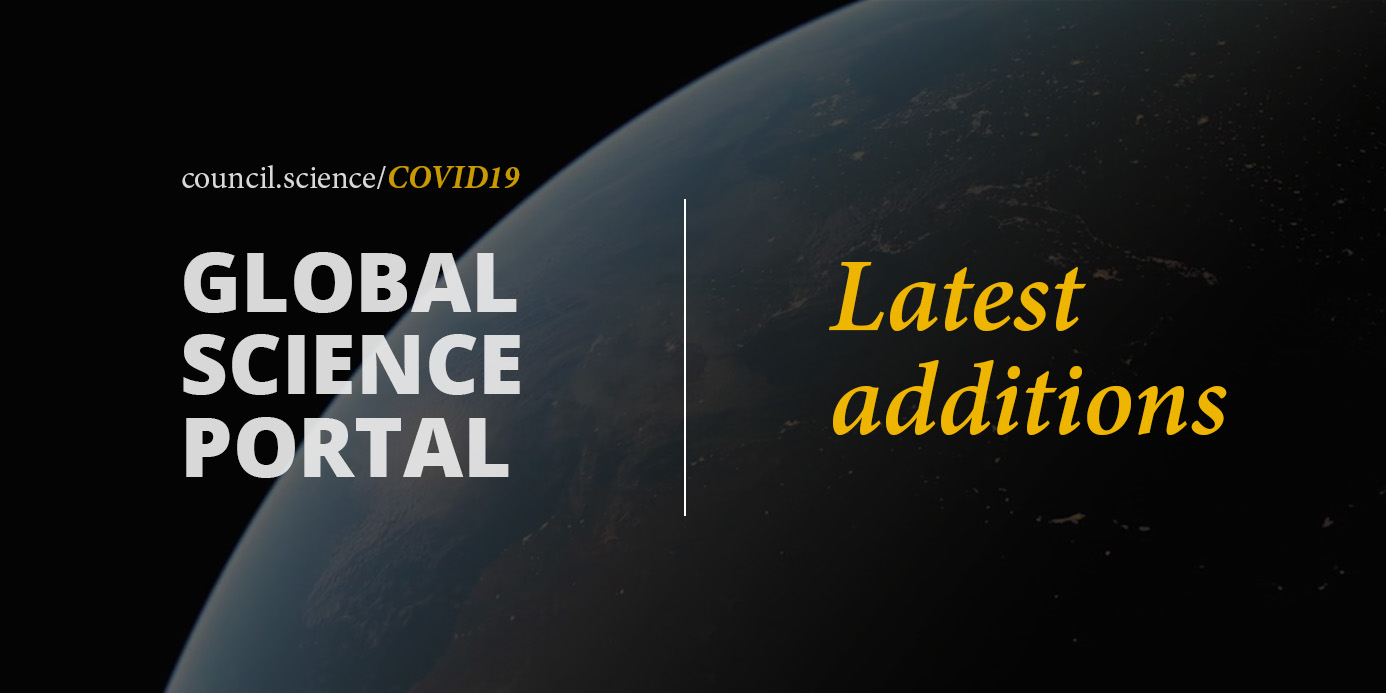The Portal, launched in March in response to this rapidly changing global emergency, continues to be populated with new information and commentary.
The portal aims to share scientific commentary and analysis, as well as to provide access to information on various initiatives by an international science community that includes scientific unions and associations, academies and research councils.
New additions for the third week of April 2020:
- Daya Reddy, President of the ISC, has sent a letter to all ISC members. Click here.
- “This is a time for science and solidarity” says UN Secretary General, Antonio Guterres. Click here.
- The U.S. National Academy of Engineering has developed an initiative to crowdsource engineering solutions for Coronavirus.
- International Council for Industrial and Applied Mathematics Mathematicians world-wide are contributing to the understanding of the Covid-19 epidemic, working with specialists such as microbiologists and virologists on mathematical models that take into account the different situations in different countries. This page collects these activities and projects from all over the world to provide a global view of the contributions of mathematics to help in the fight against COVID-19.
- Prof. Dr. Manfred Fischedick discusses the need to mobilise investments that shape a sustainable, climate-friendly, resource-efficient and, not least, resilient economy. Click here.
- Andy Stirling shines a light on ‘futilities of control’ in a blog post for STEPS (Social, Technological and Environmental Pathways to Sustainability) Centre. Click here.
- Sheila Jasanoff, a professor of science and technology studies, tells The Nation that we’ve modeled the progression of the disease, but not the social consequences. Click here.
- Kareem Buyan, from the the Urban Action Lab at Makerere University, Uganda asks – Are Cities Entering the era of Disruptive Transformations to Sustainability? Click here.
- A timely reminder from the United Nations: “Everyone is talking about COVID-19. Be sure to get your facts from reliable sources. Along with the World Health Organization, which is the leading authority on scientific and public health information on the new virus, the UN offices, field missions, agencies, funds and programmes are providing new information in their spheres of expertise, as it becomes available”. Click here for all UN resources.
- Rajib Shaw, Yong-kyun Kim and Jinling Hua have released a paper entitled “Governance, technology and citizen behavior in pandemic: Lessons from COVID-19 in East Asia”. Click here.
- Honorary secretary of the French Académie des sciences, Catherine Bréchignac, argues that democratic debate must be preserved at all costs, without the experts’ opinion being diluted in the midst of opinions not founded on reason, and discusses the crucial role of the media and social media in this interview.
- Bapon Fakhruddin discusses why the COVID-19 pandemic requires thinking and decision making supported by a data ecosystem which looks much further into the future than previous short-term approaches. Click here.
- “G-Science” Academies Stress Critical Need for International Cooperation in Responding to COVID-19 Pandemic. Click here for the statement and here for the story.
- GRIP, the Global Research Programme on Inequality continues its miniseries on COVID-19. For its 7th installment Click here.
Important additions you may have missed:
- ISC President, Daya Reddy and ISC Patron, Mary Robinson, have a joint op-ed published in Project Syndicate. Click here.
- INGSA has launched a Policy-Making Tracker and calls for global volunteers to assist in tracking how government policy is formed in response to COVID-19.
- CODATA, World Data System, the Research Data Alliance and Global Open FAIR have joined forces to optimize the research data ecosystem, launching a COVID-19 appeal as their first joint action. Read the full statement here.
- The InterAcademy Partnership has written a communique in response to COVID-19. Click here.
To see the COVID-19 Global Science Portal click here.
From 27 March 2020
Highlighting the scale and scope of response, and encouraging ISC members and partners to collaborate and share best practices during the pandemic, the portal contains information on responses by scientific communities in different fields and different countries/regions of the world. It also provides access to rapidly emerging scientific debate on the situation.
Some of the collaborations include a recent statement by the German Research Foundation and the National Natural Science Foundation of China on Encouraging and Supporting the Scientific Community to Jointly Respond to the Novel Coronavirus; a verified and reliable COVID-19 information service for the general public launched by the Australian Academy of Science; a COVID-19 resource page set up by the National Academies of Science in the USA and the launch of a webinar series focusing on the Coronavirus called Frontiers of Immunology by the International Union of Immunology Studies.
“This portal highlights how quickly the international scientific community has sprung into action, offering multi-disciplinary reflection that must contribute solutions to policy-makers in this time of crisis. It also shows the scope of knowledge being shared by the community, which includes think-pieces from social scientists on the broad impacts of the pandemic”
Heide Hackmann, CEO.
The International Science Council hopes to populate the portal with compelling essays and discussion that will drive international action in the months to come.
“This is no longer business as usual, and when we return from the lockdowns, we will be entering a new normal”, Dr Hackmann said. “We want the scientific community and poilcy-makers to be prepared, to make sure we still have our eye on the 2030 Agenda, and to think of how mission-oriented science can build pathways to solutions for the complex systemic challenges facing humanity”.
Contributions so far have included think-pieces from the International Network for Government Science Advice on the importance of evidence-informed policy decisions; the Global Research Programme on Inequality and their concern on the uneven impacts COVID-19 will have on the poor; and Future Earth on the opportunities the pandemic presents for sustainable transitions and the 2030 Agenda.
The ISC welcomes contributions from the international science community. Visit https://council.science/covid19 for more information.
